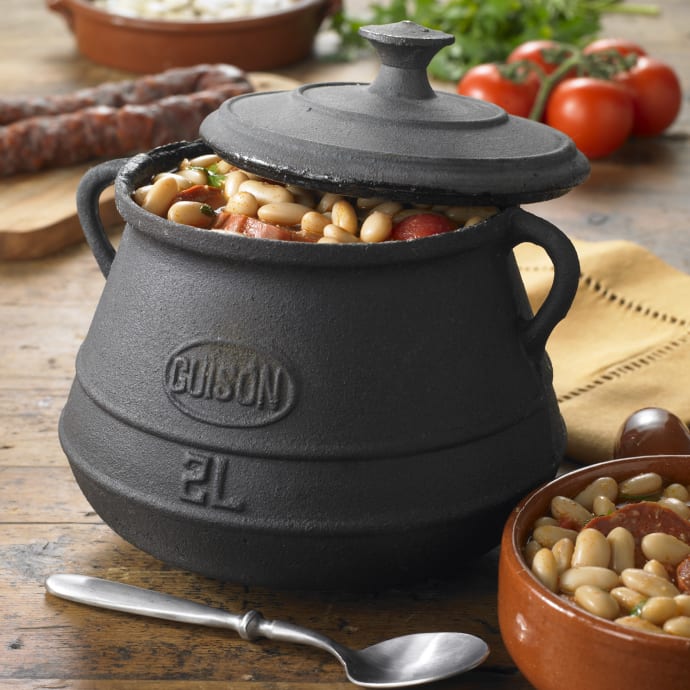
How to Get Started with Clay Pot Cooking
Food & Wine
-
February 21, 2020
The first step to cooking in a ddukbaegi, tagine, or cazuela? Finding the right vessel and learning how to use it best.
Mary-Frances Heck and Paige Grandjean
Clay pots are beloved around the world for their ability to cook especially delicious food, concentrating flavors and retaining heat with ease. From the Moroccan tagine to the Japanese donabe, these vessels aren't just hardworking cooking gear—they can go straight from oven and stove to table while looking as beautiful as their contents taste. But cooking with clay pots requires a bit of know-how. Since they're made of, well, clay, they perform differently than metal pots and pans. Check out these quick tips on seasoning, cleaning, and cooking before you get started.
Season Before First Use
The following clay pots should be seasoned before first use to temper them for cooking.
Donabe, Flameware, Chinese Clay Pots, and Bean Pots: Combine a 4:1 ratio of cool water and cooked white rice to fill the pot halfway. Set the pot over medium-low heat, bring to a simmer, and adjust heat to maintain a gentle bubble until the rice softens into a porridge. Turn off heat, and let stand until cool. Discard the porridge, and clean the pot (see right).
Tagines: Submerge pot and lid in water overnight. Wipe dry, and rub interior with a very thin layer of neutral oil. Place lid and base separately on rack in a cold oven, and heat to 325°F. Bake 2 hours. Turn off oven, and let cool completely without opening oven door, at least 4 hours.
Clean Gently
Let pots cool completely before washing. To scrape off stuck-on food, soak pots briefly in lukewarm water to soften residue and use a soft sponge to remove. Do not use soap on partially glazed or unglazed pots; use only mild detergent on flameware. If bacterial growth is of concern, dry the pots in a 200°F oven for 30 minutes before storing in a cool, dry place.
Heat Gradually
Clay cookware is sensitive to thermal shock (except some brands of flameware and Chinese clay pots insulated with metal wire), so take great care to avoid sudden temperature changes or pots will break when heated. Never heat an empty clay pot, and do not set a cold pot over high heat; instead, heat the pots gradually after filling so the ingredients heat at the same rate as the pot.
Heat water or broth before adding midway through cooking. Don’t heat clay pots directly over an electric burner, which will heat the pot too quickly and may cause thermal shock. Instead, use a diffuser, such as the Nordic Ware Heat Diffuser ($15, ?williams-sonoma.com), to soften the heat so the pot can warm gradually.
Handle Lightly
To avoid thermal shock and accidental breakage, use wooden—not metal—tools to stir food, and don’t tap spoons on the sides of pots or drag pots across burners. Place a double layer of kitchen linens as a stove-side landing pad for hot pots or lids rather than setting them directly on cold countertops, and use wooden or cloth trivets in lieu of metal.
Source Safely
If clay isn’t handled properly by the potter, the presence of heavy metals and other toxins in some clay bodies and glazes can cause lead poisoning, exposure to radiation, and a host of other health problems. Using clay from a reputable source and firing it to the appropriate temperature are key. Compliance with California Proposition 65 is currently the best measure for determining whether clay cookware and tabletop items are food-safe. Before purchasing, speak with your local potters to ensure their practices are in line with industry standards.
Where to Buy a Clay Pot
1 Mixteca Bean Pot ($79, ranchogordo.com) 2 La Chamba Soup Pot (From $40, mytoque.com) 3 Classic Terra Cotta Olla Stewing Pot ($63, latienda.com) 4 Round Dutch Oven (From $80, amazon.com) 5 Dum Biryani Pot ($56 for similar, EarthenBrowns on etsy.com) 6 Mexican Lidded Cazuela (author’s) 7 Cravings by Chrissy Teigen Tagine ($40, target.com) 8 Boston Baked Bean Pot (From $25, potshopofboston.com) 9 La Chamba Casserole (From $40, amazon.com) 10 Fukkura-san Tagine-Style Donabe (From $80, toirokitchen.com) 11 Chinese Clay Pot (From $8, wokshop.com) 12 Mole Pot (author’s) 13 Orion Langdon Bean Pot (From $125, pasquals.com) 14 Kamado-san Double-Lid Donabe Rice Cooker (From $135, toirokitchen.com) 15 Chinese Clay Pot (From $8, wokshop.com) 16 Indian Clay Curry Pot (From $30, amazon.com) 17 Mexican Cazuela ($41 for similar, mexgrocer.com) 18 Indian Clay Biryani Pot (From $28, amazon.com) 19 Korean Ddukbaegi (From $6, ekitchenary.com) 20 Hakeme Classic-Style All-Purpose Donabe (From $80, toirokitchen.com) 21 Mexican Cazuela ($41 for similar, mexgrocer.com)
Other Press
Holiday Gift Guide 2024: The Finest Spanish Olive Oils For A Taste Of Spain
Forbes
-
November 26, 2024
A trio of savory snacks to enjoy this fall
Atlanta Journal-Counstitution
-
November 1, 2024
The 15 Best Gifts for People Who Love Food
Wirecutter
-
October 23, 2024
The 48 Best Gifts for Dads
Wirecutter
-
October 16, 2024

